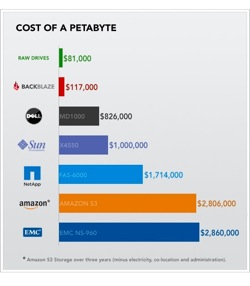Friday
Jun252010
Talk notes: Ignite Talks #2 (#DevOps Day)
 Friday, June 25, 2010 at 2:48PM
Friday, June 25, 2010 at 2:48PM
DevOps Day,
Santa Clara, CA
June 25, 2010
I'm here to participate on a panel called "DevOps Outside of Web Operations."
Ignite Talks #2
5 minutes, all slides advance every 30 seconds
I wasn't able to catch everyone's attributions.
- Netomata: like puppet for network equipment
- Petascale storage: DIY! (@tlossen: http://openstoragepod.org)

- open source hardware project for scaleable storage
- software by training, but find hardware by interest
- 988 exabytes: amount of data that will be produced in 2010
- Cost of a petabyte (see pic)
- Use laptop disks
- Wow, ATX style motherboard, and stack 12TB on top of it in one enclosure
- Only needs 600W
- Put them into pods of racks: 1.2 petabytes (6 KW of power)
- (This is hilarious...)
- Okay, let's scale it down so normal people might find it useful. So you can put it in your living room.
- Systems thinking & Value stream mapping:
- talking about tools he brings into large engagements
- MIT sloan beer game: retailer, wholesaler, distributor, factory
- talking about the overordering happens, resulting in huge backlogs and then huge excess. stable system turns very unstable.
- software production pipeline
- continuous integration, functional testing, UAT, staging, production
- stumbled upon lean value stream mapping: optimize flow (concept into cash)
- model current state: collect metrics: p/t, l/t, c&a (time wasted, production issues raised)
- note that it crosses organizational boundaries
- envision future state
- cloud supporting tools: http://libcloud.org
- cloud service providers all have different APIs
- we now provide/support 16 different cloud service providers
- APIs
- list_nodes(), reboot_note(), destroy_node(), ...
- Add data: location, price-per-hour
- deployment steps: mercury for drupal
- want to go beyond just booting machines
- it's open source: in Apache incubator
- related projects
- jclouds (author is here)
- Apache Deltacloud
- A simple story of how one company spent 10M dollars and saved nothing
- called the "zero effect"
- the victim: Gloria (like a movie script)
- the hero: Daryl Zero
- the villain: Gregory Start
- the company: High's (haha)
- the vendor: Rivoli (haha)
- story begins: $8.9M won out of $10M RFP
- the analysis: $20K
- Windows: "we've already got one" (Sponge Bob)
- AIX dudes: "too busy, won't call back" (Teenage Ninja Turtles)
- Oracle guys: "you are not worthy"
- Security guys: "you want freaking root"
- Linux folks: "hello, you guys should check out Nagios"
- HP dudes: "they were interested" ("they liked us because no one cared about them")
- Bob the CIO: "I want my damned dashboard"
- The mothership steps in and decides to do end-to-end operations analysis
- final cost: $10M
- two years later, they switched to BMC.
- Now that's a tragic story!
- Erik Sowa, Lyris: Latent Code: Lessons Learned Implementing Feature Bits (@eriksowa)
- latent code: stuff not activated, stuck in "concept to cash" cycle
- no big bangs: at mercy of lowest performing team
- the deployment pipeline
- Inspiration
- John Allsaw and Paul Hammond video
- Jez Humble and David Farley book
- technology allows prod manager to turn it on
- feature flags from Flickr and Twitter
- lessons learned
- design pressure is good: need loosely coupled and tightly cohesive
- manage the lifecycle: retire aggressively
- maintain production quality: code hidden behind feature bits is subject to same requirements as production code
- default state: decouple code rolls
- naming convention matters
- do not overload: for latent code, not for controlling who has gold/silver feature
- limit the overhead (dependencies)
- customer facing releases
- beta- and split-testing: you can use this to do customer testing, turning on for particular group of users
